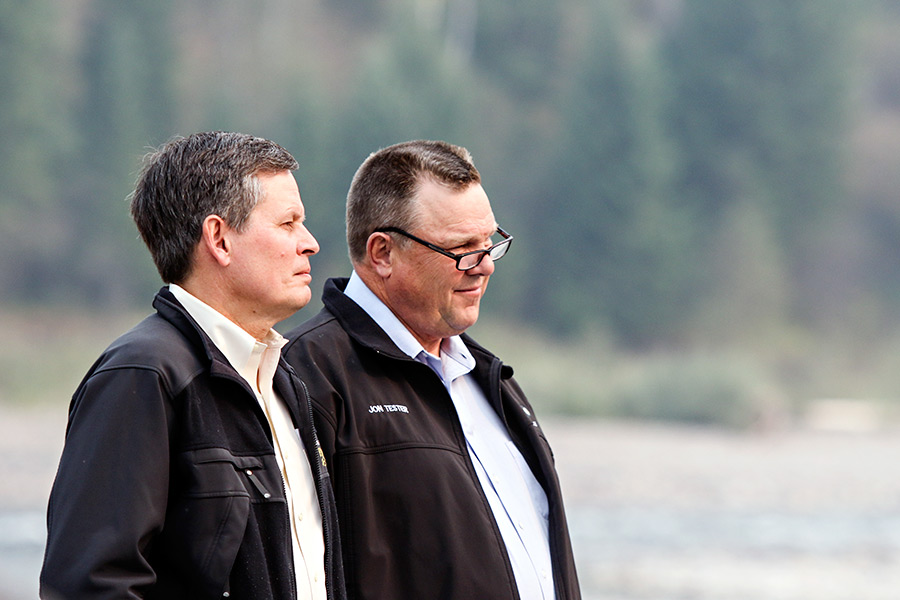Montana Legal Experts Warn that Gorsuch Will Back Dark Money
Former Montana justice, law professor urge Tester and Daines to oppose Supreme Court nominee
By Tristan Scott
The conservative political group behind a multi-million-dollar ad campaign to influence the confirmation of Judge Neil Gorsuch has taken aim at U.S. Sen. Jon Tester, pressing the Montana Democrat to vote to confirm President Donald Trump’s choice to fill the Supreme Court seat.
In a recent spate of television ads, the Judicial Crisis Network extolls the Supreme Court nominee and slams Tester and other vulnerable red-state Democrats who have straddled the fence about whether they will support Gorsuch, the nominee to fill the seat vacated by Justice Antonin Scalia’s death.
While Tester has not yet announced how he will vote on Gorsuch’s confirmation, saying he is continuing to get feedback from his constituents and review the judge’s qualifications, he has said explicitly that he is concerned about the role of money in politics, which was the topic of a tense exchange during the jurist’s confirmation hearing.
“Jon is deeply concerned about the flood of dark money that has come into Montana to try and influence this important post,” said Tester’s communications director, Marnee Banks.
Montana Republican U.S. Sen. Steve Daines has said unequivocally he would stand with his party to back Gorsuch, while two Democrats have crossed the aisle to pledge their support.
But many Democrats are still bristling over the Senate Republican majority’s refusal to even grant a hearing to Merrick Garland, former President Barack Obama’s nominee for the Supreme Court, and remain entrenched in their opposition to a Gorsuch confirmation.
Still, a panel of Montana legal experts on March 30, including a former Montana Supreme Court justice and a constitutional law professor, warned against a Gorsuch confirmation not for political retribution, but because of the proliferation of outside money in campaign spending.
According to former Montana Supreme Court Justice James Nelson, it’s no surprise that an out-of-state political action committee is going to the well to shore up support for Gorsuch’s nomination to the high court, which Nelson opposes due to Gorsuch’s record on money in politics. Nelson called Gorsuch “an Antonin Scalia wannabe” whose real aim isn’t to interpret the Constitution through an originalist’s lens, but to protect “limitless corporate political speech” rather than promote transparency.
“Sens. Daines and Tester cannot vote to confirm Judge Gorsuch,” Nelson said, “without effectively thumbing their noses at the supermajority of Montanans” who approved the Corporate Contributions Initiative, or I-166, a 2012 citizens’ initiative that instructed Montana’s members of Congress to support efforts to overturn the U.S. Supreme Court’s 2010 Citizens United decision, which struck down federal restrictions on unlimited electoral spending by corporations, unions and individuals.
Nelson, who now serves on the board of the anti-Citizens United group Free Speech for People, said Montana voters overwhelmingly approved the statewide ballot initiative, with 75 percent voting in favor, which should send a signal to the state’s congressional delegation.
Anthony Johnstone, a professor at UM’s law school, served as Montana Solicitor when he drafted an amicus brief for 26 states in Citizens United, urging the Supreme Court to leave state limits on corporate electioneering alone.
Johnstone said that Gorsuch’s 10th Circuit is famously strict about what states can do individually to govern money in politics, and that his position would track along those lines if confirmed, eroding states’ individual rights to curb outside money.
“I think the right approach is to understand that judges are principled people but politics is what decides which one of them gets on the Supreme Court,” Johnstone said. “He is a smart, articulate judge, and his opinions are fun to teach, but outside of the classroom they have major impacts, and we can anticipate major impacts on money in politics in Montana.”
As pressure mounts from both sides, Democrats like Tester, who is up for reelection in 2018, find themselves between a rock and a hard place — a vote for Gorsuch will rankle the progressive base, while a vote against the nominee will arm Republicans ahead of the election, and Tester could be made to look like an obstructionist.
The Judicial Crisis Network, the out-of-state political action committee, has reportedly pledged to spend $10 million on ad buys targeting Tester, as well as Democratic Sens. Claire McCaskill of Missouri, Joe Donnelly of Indiana, and Heidi Heitkamp of North Dakota, who on March 30 announced she would vote to confirm Gorsuch. U.S. Sen. Joe Manchin, D-West Virginia, also posted on Twitter that he would vote in favor of Gorsuch.
The same group spent $7 million lobbying to block Garland’s nomination by Obama.
Senate Democrats have indicated their intent to filibuster Gorsuch’s confirmation on April 7. A final confirmation requires a simple majority vote before the full Senate, while 60 votes are required to invoke cloture and end a filibuster.
With Republicans controlling just 52 seats, Senate Republicans could also employ the so-called “nuclear option” and change the cloture rule to require a simple majority vote to shut down a filibuster, a tactic used in 2013 by the then Democratic-controlled Senate to change the cloture requirement for cabinet confirmations and federal judges serving on a lower court to a simple majority.
Johnstone said the Republican-led Senate’s refusal to hold a hearing for a sitting president’s nominee to the United States Supreme Court was unprecedented, creating a textured environment for Gorsuch.
“That has never happened in American history where a sitting president was denied authorization to fill a seat on the Supreme Court before his successor,” Johnstone said. “As they say in diplomacy, everything is on the table for the Senate and unfortunately we are seeing the greatest level of politicization of the confirmation process that we have seen in decades. And that is bad for the court and it is bad for the confidence in the court.”